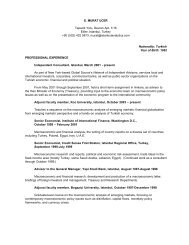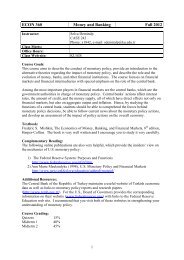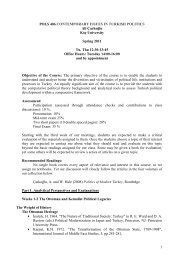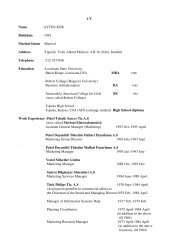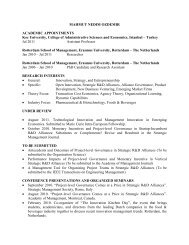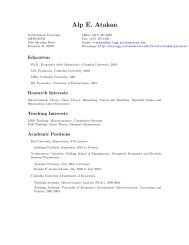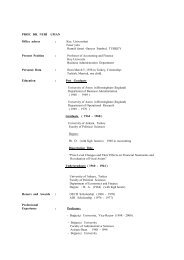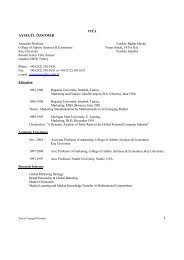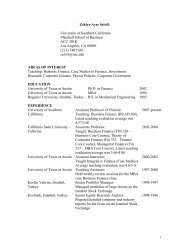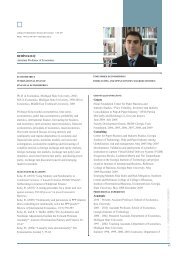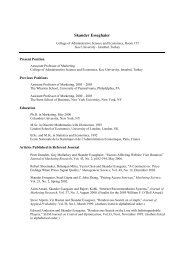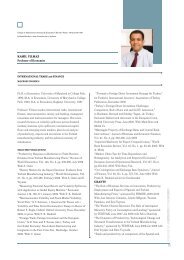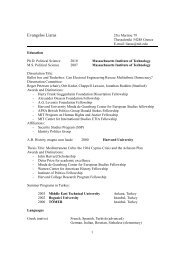David Clinton Thomas Office Address Home Address - College of ...
David Clinton Thomas Office Address Home Address - College of ...
David Clinton Thomas Office Address Home Address - College of ...
- No tags were found...
You also want an ePaper? Increase the reach of your titles
YUMPU automatically turns print PDFs into web optimized ePapers that Google loves.
<strong>David</strong> C <strong>Thomas</strong> 5<strong>Thomas</strong>, <strong>David</strong> C. & Inkson, Kerr. 2007. Careers across cultures. In H. P. Gunz & MPeiperl (Eds.) Handbook <strong>of</strong> Career Studies (pp. 451-470) London: SagePublications.<strong>Thomas</strong>, <strong>David</strong> C. & Lazarova, Mila, B. 2006. Expatriate adjustment and performance: Acritical review. In G. Stahl & I. Björkman (Eds.) Handbook <strong>of</strong> Research inInternational Human Resource Management (pp. 247-264). Cheltenham, UK:Edward Elgar, Ltd.Tung, Rosalie L. & <strong>Thomas</strong>, <strong>David</strong> C. 2003. Human resource management in a globalworld: The contingency framework extended. In D. Tjosvold & K. Leung (Eds.),Cross-Cultural Foundations: Traditions for Managing in a Global World. (pp. 103-121). UK: Ashgate Press.<strong>Thomas</strong>, <strong>David</strong> C., & Osland, Joyce. 2003. Mindful Communication. In Mendenhall, M.,Lane, H., Maznevsksi, M., & McNett (Eds.) Handbook <strong>of</strong> Global Management(pp. 94-108). Cambridge, MA: Blackwell.<strong>Thomas</strong>, <strong>David</strong>. C. 2001. Expatriate managers. In M. Warner (Ed.) InternationalEncyclopedia <strong>of</strong> Business and Management (2 nd Edition, pp. 1879-1888).London:Thomson Learning.Napier, N. K. & <strong>Thomas</strong>, D. C. 2001. Some things you may not have learned in graduateschool: A rough guide to collecting primary data overseas. In B. Toyne, Z.Martinez, & R. Menger (Eds.), International Business Scholarship: MasteringIntellectual, Institutional, and Research Design Challenges (pp. 180-197).Westport, CT: Quorum Books.<strong>Thomas</strong>, <strong>David</strong> C. 2001. Leadership across cultures: A New Zealand perspective. InKen Parry (Ed.), Leadership in the Antipodes: Findings, Implications and aLeader Pr<strong>of</strong>ile (pp.22-45). Wellington, NZ: Institute for the Study <strong>of</strong> Leadership.Ravlin, E. C., <strong>Thomas</strong>, D. C., & Ilsev, A. 2000. Beliefs about values, status, andlegitimacy in multicultural groups: Influences on intragroup conflict. In P. C.Earley & H. Singh (Eds.), Innovations in International and Cross-CulturalManagement (pp. 17-51). Thousand Oaks, CA: Sage.Proceedings Publications:Brannen, Mary Yoko, Garcia, Dominie, & <strong>Thomas</strong>, <strong>David</strong> C. 2009. “Biculturals as naturalbridges for intercultural communication and collaboration” Proceedings <strong>of</strong> theInternational Workshop on Intercultural Collaboration, Stanford University, PaloAlto, CA, USA.Peel, Simon & <strong>Thomas</strong>, <strong>David</strong> C. 2004. “Cultural variation in the psychological contract:Pakeha and Polynesians in New Zealand.” Proceedings <strong>of</strong> the Australia and NewZealand Academy <strong>of</strong> Management. Dunedin, New Zealand.<strong>Thomas</strong>, <strong>David</strong> C. & Au, Kevin. 2000. “Cultural variation in the psychological contract.”In S.J. Havlovic (Ed.) Academy <strong>of</strong> Management Best Paper Proceedings, (pp. IMF1-F6) Toronto, Canada.



